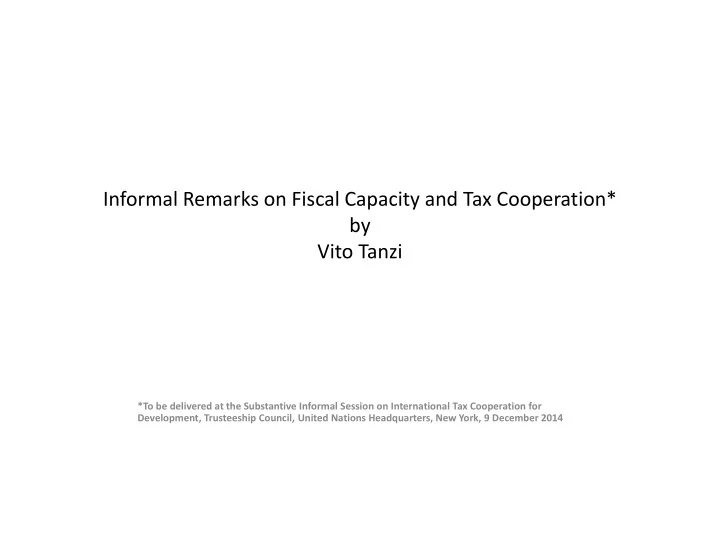

Informal Remarks on Fiscal Capacity and Tax Cooperation* by Vito Tanzi *To be delivered at the Substantive Informal Session on International Tax Cooperation for Development, Trusteeship Council, United Nations Headquarters, New York, 9 December 2014
Informal Remarks on Fiscal Capacity and Tax Cooperation Focus will be mostly on Developing Countries • There are actions that the Developing Countries can take unilaterally: • (a) Use their available resources more efficiently; (b) Reduce distortive subsidies, such as those on energy consumption; (c) Increase public revenue by: i. Widening VAT bases; ii. Increasing taxes on products that generate negative externalities; iii. Reducing tax incentives to private enterprises; iv. Reducing the favorable treatment of incomes from capital sources; v. Limiting deductions for the use of debt finance by enterprises; vi. Raising the level of personal exemptions for personal income taxes; vii. Finally, improving the efficiency of the tax administrations.
Informal Remarks on Fiscal Capacity and Tax Cooperation All of the above actions can increase “fiscal space”. • Let us consider global aspects, distinguishing: • (a) Ideological and theoretical aspects (b) Structural aspects (c) Policy aspects. Ideological and theoretical aspects that have contributed to current • revenue difficulties: (a) The supply ‐ side revolution of the 1980s, that led to the general lowering of tax rates; (b) The “Laffer Curve”, a product of the supply ‐ side revolution; (c) The inflation experiences of the 1970 ‐ 1980s period. They created “fiscal drags” and demands for lower tax rates; (d) The progressive globalization of economic activities. It made capital more mobile than in the past, promoting reasons for lower tax rates.
Informal Remarks on Fiscal Capacity and Tax Cooperation • Structural aspects: (a) The growing importance of services; (b) The growth of intangible products; (c) The growing importance of intangible capital in production. Consequences: (a) Creation of global chains of production; (b) Growth of global enterprises; (c) Growth of trade within global enterprises; (d) Growth of tax competition between countries; (e) Growing importance of tax planning by enterprises; (f) Incentives to global tax avoidance schemes.
Informal Remarks on Fiscal Capacity and Tax Cooperation Factors contributing to global tax avoidance: • (a) Use and abuse of debt finance; (b) Debt finance obtained from tax havens; (c) Inflated royalties for use of intellectual property; (d) Legal nesting of intellectual property in tax havens; (e) Abuse of “transfer prices” in allocating values among countries. Common tax avoidance schemes: • (a) Thin capitalization; (b) Loans from tax havens; (c) Use of intellectual property from tax havens; (d) Inflating royalty payments; (e) Excessive charges for management and similar expenses; (f) Use of imaginative contractual arrangements to allocate value and profits to tax havens, or to low ‐ tax jurisdictions; (g) Others
Informal Remarks on Fiscal Capacity and Tax Cooperation Possible paths to solution: • (a) Reevaluation and reassessment of established tax principles; (b) Restrictions on the use of debt, in place of equity; (c) Developments of some formula to allocate profits among national jurisdictions; (d) Making greater use of withholding taxes; (e) Making greater use of source taxation; (f) Increasing pressure on tax havens; (g) Limiting deductions for use of intellectual property; Others: (a) Challenging bilateral tax treaties and pushing for a uniform, global treaty; (b) Denying deductions for payees located in tax havens; (c) Requiring corporations to present detailed country by country accounts; (d) Making more use of exchange of information; (e) There must be others to be studied.
Informal Remarks on Fiscal Capacity and Tax Cooperation There will be much resistance from many powerful quarters against any • of the above “solutions.” It would be naïve to expect easy solutions. • At the same time, it ought to be recognized that a continuation of the • present dynamics could in time lead to chaos and to great difficulties to all countries to raise badly ‐ needed taxes. A kind of “Manhattan Project” may be needed to study possible solutions • and to push for their adoption by the international community.
Informal Remarks on Fiscal Capacity and Tax Cooperation Who would participate in such a Manhattan project: • (a) It should be coordinated by major international institutions (UN, IMF, OECD, WTO, others). They ought to work jointly to study and to propose reasonable and not extreme solutions to the countries. (b) Perhaps representatives from advanced and developing countries should be involved in the work. They might be nominated by the leading groups such as OECD,G20, UN and others. (c) At a later stage an official group (for convenience let us call it a “World Tax Authority”) should become the official promoter of the global action. (d) The above official group would perform a function of promotion of tax principles and of surveillance over countries’ tax policies. It would, in no way, be engaged in fixing tax rates. (e) Global tax rules should come to be seen as a global public good to reduce tax avoidance and abuses and to promote the interests of the global community. (f) Its main goal should not be that of increasing the world tax burden but that of providing fair access to the global tax base by each country.
References • Vito Tanzi, 1995, Taxation in an Integrating World (Washington: The Brookings Institution) • Vito Tanzi, 2001, “Globalization, Technological Developments and the Work of Fiscal Termites”, Brooklyn Journal of International Law , Volume XXVI, No 4. • Vito Tanzi, 2008, “Globalization, Tax Systems, and the Architecture of the Global Economic System” in Taxation and Latin American integration, edited by V. Tanzi et al. (Harvard University). • Vito Tanzi, “Globalization and Taxation: A Brief Historical Survey”, Rivista di diritto finanziario e scienza delle finanze, LXXIII,1, 2014, pp1 ‐ 18.
Recommend
More recommend